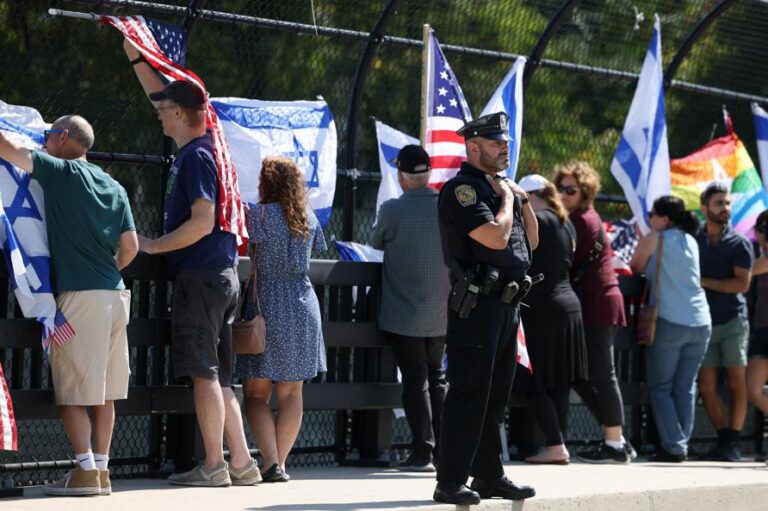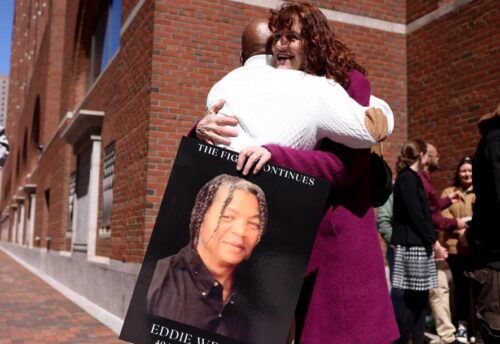After a shooting at a pro-Israel rally in suburban Newton in September, a Zionist group rushed to fan the flames and called for a boycott of the city.
Two months later, Betar US took aim at Memphis, demanding that the murder of an Israeli-born locksmith be investigated as a hate crime. Now, the US chapter of the century-old Zionist group is engaged in its most audacious gambit — attempting to steer government deportations of foreign students who have advocated on behalf of Palestinians.
Betar is among a handful of groups that are circulating lists and taking credit for the Trump administration’s efforts to deport the people on them.
Seven people targeted in recent weeks were flagged on a list compiled by Betar, including two from New England — Tufts University student Rümeysa Öztürk, who was seized in late March, and Columbia University activist Mohsen Mahdawi, who was detained in Vermont on Monday.
It is unclear to what extent — if at all — the administration relies on the lists from Betar or Canary Mission, another pro-Israel group, which has been collecting names of such protesters for about a decade.
The State Department would not say if it is working with those organizations, replying to the Globe that regardless of the source of the information, visa decisions are made by trained consular staff.
But attorneys for five of those targeted cited Betar or Canary Mission lists in lawsuits opposing the deportation. An attorney for Öztürk, Marty Rosenbluth, said the organizations were once seen as “gadflies,’’ but now have the ear of like-minded officials in the Trump administration who are “actually more than willing to act on the information.’’
Ronn Torossian, a New York public relations guru who founded the nonprofit Betar US, declined to comment, and the organization itself would not provide a list of activists it gave to the administration.
But the Globe reviewed a “Students Deport List’’ that Betar had briefly posted on its website last week. It originally named 77 people and included photos and a brief description of their alleged offenses.
That list has multiple inaccuracies: It sometimes placed students at the wrong universities or featured people who were not even in the United States. And some of the reasons cited by Betar for deportation seemed minor, such as jaywalking or a noise complaint.
One woman on the list was pictured wearing a hijab and identified as a Harvard student from Nigeria who had already been detained in Massachusetts. Betar claimed she should be deported because her visa had been revoked in March for a pro-Hamas rally speech.
Contacted by the Globe, the woman, who spoke on the condition her name not be used, said she was shocked to be featured on the website. She said she has never visited the United States; never attended Harvard, as Betar claimed; and never attended a pro-Hamas rally.
“I am devastated that my picture has been used in this way to support Betar’s narrative,’’ she wrote in an email. “It is completely false.’’
Another person Betar had flagged as a student in Illinois and a pro-Hamas rally organizer told the Globe all the information about him on the site was false. He graduated from a Canadian university, never organized a pro-Hamas rally, and according to his online resume got his degree several years before the protests rocked many universities.
“The legitimacy of this group is certainly questionable,’’ said this second person, Tarek, who asked to be identified only by his first name to protect his privacy. He said he contacted Betar last week about the misinformation and threatened legal action. Soon afterward, he said, the entire list was removed from Betar’s site.
An Egyptian student at a California university was also included on Betar’s list for joining a Gaza solidarity march; he had purportedly been detained in Los Angeles. The person named and pictured, however, appears to be the Moroccan ambassador to the United States.
The list also included Öztürk and Mahdawi. It had been reduced to 68 people before it was removed from Betar’s site earlier this week.
No one from Betar would answer questions from the Globe about its list, including where it gets its information, what it does to verify allegations, what merits inclusion on the list, and whether it is the same list provided to the Trump administration.
A spokesperson, who was not identified, responded to emailed questions about the list with a short statement: “go to hell . . . Who are you to judge us?’’
In its latest move, Betar US this week predicted Immigration and Customs Enforcement would next target the University of Massachusetts Amherst.
The current US branch of Betar emerged last spring and, according to its website, hopes to establish 25 chapters across the country this year. The group’s Gofundme page says it has raised, since June 2024, about $44,000 of its $500,000 goal.
Despite the modest fund-raising amount, the nascent nonprofit with a mantra of “Jews fight back’’ has gained an outsized voice, driven by a leader with a powerful Rolodex. The founder, Torossian, has organized fund-raisers for New York City Mayor Eric Adams and done public relations work for the Eric Trump Foundation.
The IRS determined Betar exempt from federal taxes last July as a charitable organization, but the group has not registered its nonprofit status with the New York attorney general’s Charities Bureau as required by state law. The agency sent a letter to Betar requesting it register, a spokesperson said.
For an organization with a strident presence online, few affiliated with Betar were willing to discuss its efforts.
The only Betar affiliate who would speak at length is a New York marketing executive, Ross Glick, who lasted three months as executive director. Brought on to Betar by Torossian, Glick left the organization in January, amid a resurfaced 2019 story that he had been among the first charged under New York’s new revenge porn law. Glick denies he left because of the story.
In an interview with the Globe, Glick declined to say who in the federal government received Betar’s list of student activists, but said Betar’s surveillance of campus demonstrations complemented the Trump administration’s mission to deport foreign protesters.
“We want to help our government,’’ Glick said. “This part is so not complicated, because this administration, this is their agenda.’’
Betar’s student list drew attention in November when Glick told the New York Post that he’d taken it to D.C. and met with Democratic Senator John Fetterman of Pennsylvania and aides to Republican Senators Ted Cruz and James Lankford.
However, Fetterman and Lankford’s offices distanced themselves from those interactions. Cruz’s office did not respond to requests for comment.
Lankford’s staff said they have no record of the senator or his staff meeting with Glick or anyone associated with Betar.
Staff for Fetterman, a Democrat who has been an outspoken voice for Israel, said he only ran into Glick in a Capitol hallway.
“I absolutely deny any involvement with this group whatsoever,’’ Fetterman said in a statement. “I do not support private organizations coming up with deportation lists, and in any event, I would never participate or assist in that.’’
In his Capitol Hill encounter, Fetterman was captured on video admiring one of Betar’s most controversial campaigns: Handing out beepers to supporters of Palestine — a provocative echo of the coordinated detonations of pager bombs that targeted members of the Hezbollah militant group, killing dozens and injuring thousands in September.
The beeper stunts got Betar kicked off Meta platforms in November and contributed to the Anti-Defamation League labeling Betar as an extremist group.
Last week, US Representative Ritchie Torres of New York, a steadfast supporter of Israel whose campaign has benefited from Torossian’s fund-raising, publicly broke with Betar. Torres suggested the group was embracing extremism and he told The Nation he was also cutting ties with donors who were trying to get students deported for pro-Palestinian speech.
Betar remained defiant. In recent days the organization has refocused on Massachusetts, suggesting it is “terrible for Jews’’ and urging Israeli companies to leave.
Betar made similar claims about Newton last fall after the shooting. The group blasted prosecutors for charging Scott Hayes, a pro-Israeli supporter who shot a pro-Palestinian man who had tackled him during a small demonstration.
The group’s previous call for a boycott didn’t take off, officials in Newton said.
“My understanding was that they were really a very fringe group who just seemed to be taking advantage of the moment,’’ said Greg Reibman, president of the Charles River Regional Chamber. “There seemed to be no substance to what they were doing or how they were organizing it.’’
Hayes, who was arrested for allegedly shooting the 32-year-old man, said he was grateful for Betar’s support in bringing international attention and donors to his case. An Iraq War veteran, he is set to go to trial in July on one count of assault and battery with a dangerous weapon.
Caleb Gannon, who allegedly tackled Hayes prior to the shooting, was charged with assault and battery several months after the incident. Gannon’s case is pending in Newton District Court.
Stephanie Ebbert can be reached at Stephanie.Ebbert@globe.com.
Deirdre Fernandes can be reached at deirdre.fernandes@ globe.com.

